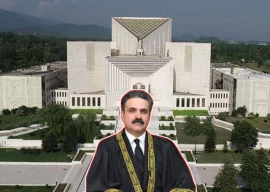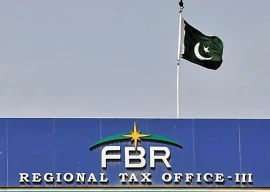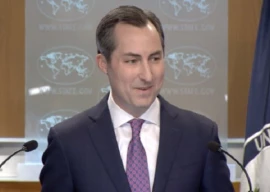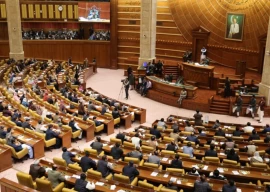
A powerful group comprising federal ministers, elected officials, and senior civil servants allegedly embezzled Rs300 billion through the illegal dumping, smuggling, and black-marketing of fertiliser imported by the government, according to an official inquiry report.
Detailed background interviews of informed government officials conducted by the Express Investigation Cell revealed both the scale of the fraud as well as the manner in which it was conducted.
Among the officials implicated in the alleged scam are former Industries Minister Mian Manzoor Wattoo, his predecessor Mir Hazar Khan Bijarani, Senator Ismail Baleedi from Balochistan, as well as a shockingly large number of senior officials from the industries minister, the state-owned Trading Corporation of Pakistan (TCP), and the National Fertilizer Marketing Ltd (NFML). Many of the officials named in the report are still serving within the government.
If the details portrayed in the inquiry report are accurate, the scam was remarkably elaborate and relied on the cooperation of officials who knew exactly how the complex logistical operation of the government’s import and distribution of fertiliser works.
Given Pakistan’s chronic shortage of urea, the government imports the fertiliser every year. TCP is charged with importing the fertiliser and then passing it off to NFML, which distributes it locally. The government subsidises the urea by making the NFML sell it at far below global import rates, importing it at around Rs2,550 per 50-kilogramme bag and selling it for Rs1,050 per bag.
While NFML has its own distribution network, much of the actual sales of fertiliser are done through thousands of authorised dealers, who are required to sell the fertiliser at prescribed rates. Yet it appears that between 2009 and 2011, this elaborate nationwide network effectively ceased to deliver subsidised urea to Pakistani farmers, forcing them to pay global market rates, while still leaving the taxpayer with the bill for subsidising the fertiliser.
“Over 50% of the imported urea (500,000 tons) simply did not reach its destination,” says the report.
The group allegedly behind the scam went to quite some trouble to hide their tracks. The report states that they created almost 600 fake dealers and agencies which were then given authorisation to distribute subsidised fertiliser through the connivance of corrupt officials both at the industries ministry as well as TCP and NFML. Around 30 officials were allegedly inducted into NFML specifically to facilitate corrupt transactions, the report alleges.
Mobile units were set up throughout the country to give the appearance of a legitimate, government-sponsored operation to distribute urea. But the report claims that it was all an elaborate ruse.
Once the fake dealers were able to procure the cheap fertiliser, they dumped it into storage sites across the country and waited for the resultant artificial shortage of urea to drive up local prices, forcing farmers to pay up to double what should have been the subsidised price. Prices shot up from Rs1,050 (the mandated price) to Rs1,800 in 2009 and Rs2,000 in 2010. The entire network of corrupt officials allegedly pocketed the difference, which amounts to a whopping Rs300 billion.
“A survey of the outlets was conducted which made the stunning disclosure that on the direction of powerful politicians, NFML set up hundreds of fake dealers/agencies to dump and sell imported urea, at black market rates,” reads the report.
The investigation further makes it clear that the fraud had help from people in positions of authority, who designed policy to facilitate the scam. “There is undeniable evidence that dumping of urea has taken place. There is also evidence that decisions were made that could lead to further dumping through establishment of mobile and temporary fertiliser stores.”
As one reads through the report, the allegations continue to get more damning. “The NMFL management has knowledge of urea dumping and smuggling between the summer of 2009 and December 2010, but did not carry out any disciplinary action against any contactor or dealer,” it reads in one place.
The inquiry report itself is remarkably impressive, naming nearly every single official involved, as well as the names and details of every one of the fake agencies and dealerships. It points out that Wattoo’s home district of Okara has a disproportionately high number of the dubious entities.
A letter sent by NFML, dated June 25 of this year, requests action from the National Accountability Bureau (NAB) against the allegedly corrupt officials, but so far no action appears to have been taken.
Indeed, far from any action being taken on the basis of the inquiry’s recommendation, the inquiry committee’s members – Chaudhry Sharif, Faiz Ali Bukhari, Muhammad Akbar and Amin Mukhtar Gondal – have allegedly faced retribution from the officials involved in the scam. Sharif was reportedly sacked from the NFML for his role in the inquiry.
Most of those named in the report deny any wrongdoing. Kashmir Affairs Minister Mian Manzoor Wattoo denies having any involvement in the fake agencies scandal. “Farmers still remember my tenure when urea was available at Rs750 a bag. Nobody can point fingers at me for the fertilizer import and delivery [scam].”
Wattoo’s personal secretary claims that his name was included in the report on account of bias by the investigators. Mir Hazar Khan Bijarani was not available for comment, despite several attempts to reach him by telephone and text message.
Senator Ismail Baleedi was perhaps most upfront about his involvement, admitting that he had written a letter to the NFML management requesting that the distribution contract for his district be given to Humsafar Transport Company. “Being a senator and public representative I asked the NFML management, in writing, to give the urea transportation contract to Humsafar Transport Company on merit. I think by doing so I did nothing wrong,” he said.
Industries Secretary Aziz A Bilour declined to comment on the matter. Agha Nadeem, an additional secretary at the ministry, was asked by Bilour to comment on the matter. At first Nadeem was reticent to discuss the subject before finally saying: “It is the NFML board which decides each and every issue of the organisation and it should be approached for further queries or comments.”
When asked to comment, NFML Managing Director Tariq Shafi said: “I am not aware of the inquiry committee report and therefore cannot say anything on authority. However, I think it is an issue which occurred before my taking charge at NFML.”
Published in The Express Tribune, December 29th, 2011.
COMMENTS (19)
Comments are moderated and generally will be posted if they are on-topic and not abusive.
For more information, please see our Comments FAQ
1730464111-0/raygun-(1)1730464111-0-405x300.webp)
1730464033-0/BeFunky-collage-(12)1730464033-0-165x106.webp)

1730462074-0/BeFunky-collage-(10)1730462074-0-165x106.webp)













This should be a lesson to all. It is obvious that the farmers who were willing to pay the prevailing market rates for the fertilizer could and did pay the rate. If the government gets out of this whole "providing subsidies" business then these scams would not happen. The farmer would be able to buy what he/she needs at the prevailing market rates. All these subsidies go into the pockets of the politicians and other government servants - the people for whom the subsidies are intended always end up paying the market rate.
Disgusting.
Same government privatized and sold pak china fertilizer company - one of the biggest urea manufacturing plants in asia in early 90s - to schon group (our presidents good friends). The plant was sold for Rs 3 billion which was never paid to the government. The plant shut down after 3 years as the new owners defaulted on loans acquired against the acquisition. Shutting down of such plants adds to the shortages today. Same bag of urea locally produced would be selling for half the price right now, if the plant was still operational but pity its just scrap metal now.
Hammer time! These are the cases that need the most urgent attention of our judiciary rather the the petty politicial issues that are currently wasting its time.
And then people say why PTI makes such a big issue out of corruption???
Where is NAB and FBR???????
Current situation on ground is that NFML officials are selling Urea to their "favorite" dealers at official price of Rs.1300/bag taking Rs.100/bag "commission" openly and dealers are diverting NFML warehouse bound trucks coming from port to their customers(sub-dealers) all over the Pakistan at Rs 1500/bag which is being sold to consumers (farmers) in the market at Rs.1550/bag....
Food security is biggest issue for ordinary Pakistanis, and fertilizers are vital part of modern agriculture. First of all government should subsidize fertilizers which will definitely help bring food prices down. Today most farmers and peasants are sticking to agriculture profession because there is nothing else to do, if we start counting inputs from tilling, harvesting, machinery prices, fuel price, exorbitant fertilizers prices, and hard labour under 45C heat, a farmer does not earn even five rupees per day. On top of our governments apathy towards agriculture, we have to put up with corruption, May God help us.
Waiting for the comments like "It is the conspiracy against Democracy"-----"We have achieved 80 % of our manifesto". " "Media/courts/establisment is interfering in our mandate".
@Yousuf Pishori: \Maybe but this is the government that the people of PAK elected.
Don't worry guys. Our president has completed 80% mandate and is just trying to complete the remaining 20%.
One More Scandal....This Government has FAILED Miserably
Anyone surprised?
This is what happens when there is no rule of law and weak national instutitions.
Democracy is the best revenge! We won't let Benazir's blood go to waste etc! Keep it up!
Nothing new. This inquiry will go in court and they will say its against democracy. Inquiry commission will be made but they will just eat lunch and discuss about re-election. If they came back in power all the people who provided information will be fired if not assassinated. If not in power they will just say government is attacking opposition.